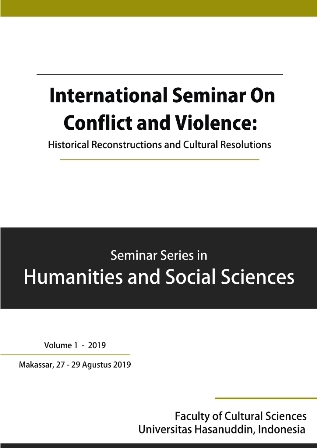POST CONFLICT RESOLUTION OF THE 2019 PRESIDENTIAL ELECTION
Abstract
The presidential election held on April 17, 2019 shows the success of the democratic system in Indonesia. However, in the process, the actors who ran for the 2019-2024 period encouraged them to win political competition. This desire indirectly caused conflict against the community triggered by differences in the interests of each elite group of political parties. On May 22, 2019, the General Election Commissioner (KPU) officially announced the results of the 2019 presidential election which appointed Joko Widodo and Ma'aruf Amin as winners. political contestation for the next five years. On the other hand, the Prabowo and Sandi couples also declared victory and did not recognize the vote count results issued by the KPU due to a number of fraudulent evidence by the National Winning Body 02. Constitutionally, pair 02 may file an appeal to the Constitutional Court for a period of 3 days after the announcement KPU results. On 21-22 May 2019 there was violence in Jakarta which showed disagreement with the announcement of the vote count results by the KPU. Writing this journal, the author develops the nature of descriptive and non-experimental writing. This journal tries to analyze the level of conflict caused by the 2019 presidential election until conflict resolution can be offered. This study uses secondary data types. Methods of data collection carried out by the author using a systematic method, referring to some literature, literature review and identifying various inputs and information. In resolving this conflict, a mediator is needed that is able to unite political elite leaders so that the conflict does not extend to the community which allows internal security instability. Conflict resolution must also be carried out until the achievement of positive peace that resolves conflicts to the root of the problem.Keywords: Conflict Resolution, 2019 Presidential Election
References
Bettye Pruitt dan Katrin Käufer. 2001. Dialogue as a Tool For Peaceful Conflict Transformation, Civic Scenario/Civic Dialogue Workshop. New York: United Nations Development Programme.
Burton John. 1990. Conflict: Resolution and Provention. London: MacMillan Press.
Charles Webel dan Johan Galtung. 2007. The Handbook of Peace and Conflict Studies. New York: Routledge
Lederach, J. P. 1995. Preparing for Peace: Conflict Transformation Across Cultures. New York: Syracuse University Press.
Morton Deutsch dan Peter T. Coleman, eds., The Handbook of Conflict Resolution: Theory and Practice.
Tuliameni Kalomoh. (16 Februari 2006). Statement: Secretary-General's message to the Tokyo International Conference on African Development Conference on the Consolidation of Peace. United Nations. Diakses 27 Januari 2015.
News:
Andi Widjayanto. (17 Juni 2004). “Empat Tahap Resolusi Konflik”. Tempointeraktif.com. Diakses 23 Juni 2019.

